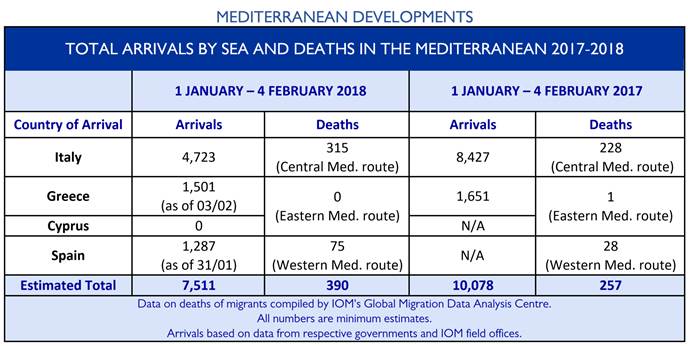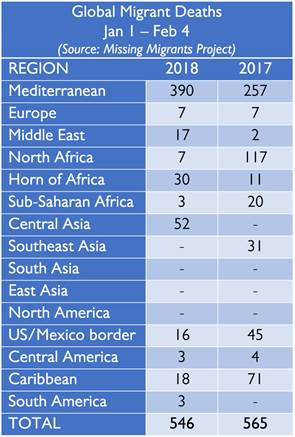-
Who we are
WHO WE AREThe International Organization for Migration (IOM) is part of the United Nations System as the leading inter-governmental organization promoting since 1951 humane and orderly migration for the benefit of all, with 175 member states and a presence in 171 countries.
-
Our Work
Our WorkAs the leading inter-governmental organization promoting since 1951 humane and orderly migration, IOM plays a key role to support the achievement of the 2030 Agenda through different areas of intervention that connect both humanitarian assistance and sustainable development.
What We Do
What We Do
Partnerships
Partnerships
Highlights
Highlights
- Where we work
-
Take Action
Take Action
Work with us
Work with us
Get involved
Get involved
- Data and Research
- 2030 Agenda
Mediterranean Migrant Arrivals Reach 7,511 in 2018; Deaths Reach 390
Geneva – IOM, the UN Migration Agency, reports that 7,511 migrants and refugees entered Europe by sea through the first five weeks of 2018, with about 62 per cent arriving in Italy and the remainder divided between Greece and Spain, both at roughly 19 per cent. This compares with 10,078 arrivals across the region through the same period last year.

On Monday (05/02) IOM Rome reported Italy’s official Ministry of Interior figures indicate some 4,723 migrants arrived by sea to Italy this year, which is roughly a 45 per cent decline from the same period last year, when 8,427 arrivals were recorded.
IOM Athens’ Kelly Namia reported that over the previous four days, the Hellenic Coast Guard informed IOM of only one incident requiring search and rescue operations off the island of Rhodes, on 31 January. The Coast Guard rescued 30 migrants and transferred them to the island. Nine others arrived the same day on Kos – while no other landings were reported over the next three days.
Through Saturday (03/02) IOM reports just 1,501 irregular arrivals to Greece by sea, an average of just under 45 per day.
IOM Spain’s Ana Dodevska reported that total arrivals at sea in 2018 have reached 1,503 men, women and children who have been rescued in Western Mediterranean waters through 5 February.
In the Western Mediterranean, the bodies of 17 migrants and refugees were pulled from the sea off the coast of Melilla, Spain on 3 February. The bodies were spotted on Saturday by a Spanish passenger boat, and sixteen of them were recovered by Moroccan authorities. One body was found in a separate location by a Spanish police boat and was taken to Melilla. Spanish NGO Caminando Fronteras confirmed that 47 people were travelling on the boat when it capsized, therefore as many as 30 people remain missing. Among the victims of the tragedy are people from Mali, Guinea Conakry and Cote d'Ivoire.
Additionally, there has been more recent information that the Guardia Civil and Salvamento Maritimo have launched a search of another small boat in the waters of the Strait of Gibraltar. A search began after the alert of a non-governmental organization, which reported about the presence of a boat near the Strait of Gibraltar.
According to the media agency EFE there were 10 migrants from Sub-Saharan Africa travelling on this boat.
Since the start of December, the Western Mediterranean has been the deadliest of all Mediterranean routes, with over 100 deaths at sea over the past 10 weeks. Total deaths in the Mediterranean in 2018 now stand at 390 through 04 February, compared with 257 at this time last year.
Worldwide, IOM’s Missing Migrants Project has recorded 546 migrant fatalities in 2018. On the US/Mexico border, three migrants drowned when crossing the Río Bravo on 31 January. Their bodies were recovered at different locations in the Mexican state of Tamaulipas. In Europe, Croatian authorities reported that they found the body of a man, believed to be a migrant, in a river that flows along the country's border with Slovenia on 2 February.
MMP data are compiled by IOM staff but come from a variety of sources, some of which are unofficial. To learn more about how data on missing migrants are collected, click here.

Latest Mediterranean Update infographic here
For latest arrivals and fatalities in the Mediterranean, please visit: http://migration.iom.int/europe
Learn more about the Missing Migrants Project at: http://missingmigrants.iom.int
For more information, please contact:
Joel Millman at IOM HQ, Tel: +41 79 103 8720, Email: jmillman@iom.int
Mircea Mocanu, IOM Romania, Tel: +40212115657, Email: mmocanu@iom.int
Dimitrios Tsagalas, IOM Cyprus, Tel: + 22 77 22 70, E-mail: dtsagalas@iom.int
Flavio Di Giacomo, IOM Coordination Office for the Mediterranean, Italy, Tel: +39 347 089 8996, Email: fdigiacomo@iom.int
Hicham Hasnaoui, IOM Morocco, Tel: + 212 5 37 65 28 81, Email: hhasnaoui@iom.int
Kelly Namia, IOM Greece, Tel: +30 210 991 2174, Email: knamia@iom.int
Julia Black, IOM GMDAC, Germany, Tel: +49 30 278 778 27, Email: jblack@iom.int
Olivia Headon, IOM Libya, Tel: + +216510 84554 , Email: oheadon@iom.int
Ana Dodevska, IOM Spain, Tel: +34 91 445 7116, Email: adodevska@iom.int
Myriam Chabbi, IOM Tunisia, Tel: +216 71 860 312 ext. 109, Mobile +216 28 78 78 05, Email: mchabbi@iom.int

